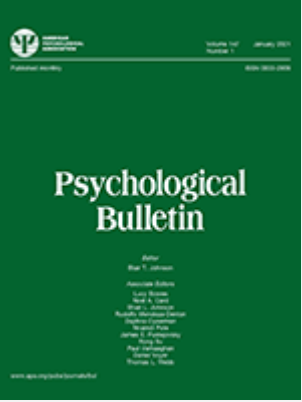感觉良好,做得好,出人头地:工作中亲社会动机结果的元分析调查。
IF 17.3
1区 心理学
Q1 PSYCHOLOGY
引用次数: 0
摘要
近年来,越来越多的文献揭示了工作场所中亲社会动机的重要成本和收益。然而,研究人员使用各种标签、概念化和操作化来研究亲社会动机,使这一知识体系支离破碎。在本研究中,我们通过提供一个整合的框架来为文献做出贡献,该框架沿着两个维度组织亲社会动机的现有结构和测量:自主性水平(自由裁量/义务)和普遍性水平(全球/语境/位置)。根据这一框架,我们对252个样本和666个效应量进行了荟萃分析,以检验亲社会动机对工作场所结果的影响。为了解决实证文献中的不一致之处,并了解亲社会动机在何种情境下产生最强或最弱的影响,我们进行了调节分析。我们发现,一般来说,亲社会动机对员工的幸福感(ρ¯^ = .23)、亲社会行为(ρ¯^ = .35)、工作表现(ρ¯^ = .20)和职业成功(ρ¯^ = .06)都是有益的。这些影响的方向和程度取决于亲社会动机的自主性、普遍性和测量,结果的性质(即亲社会行为的类型、绩效测量的主观性和职业成功的形式),以及文化背景。重要的是,亲社会动机在预测所有四种结果方面的效度高于一般认知能力和大五人格特征。我们讨论了这些发现的理论、方法和实践意义,并为未来的研究工作提供了一个指导框架。本文章由计算机程序翻译,如有差异,请以英文原文为准。
Feeling good, doing good, and getting ahead: A meta-analytic investigation of the outcomes of prosocial motivation at work.
In recent years, a rapidly growing literature has shed light on important costs and benefits of prosocial motivation in the workplace. However, researchers have studied prosocial motivation using various labels, conceptualizations, and operationalizations, leaving this body of knowledge fragmented. In this study, we contribute to the literature by providing an integrated framework that organizes extant constructs and measures of prosocial motives along two dimensions: level of autonomy (discretionary/obligatory) and level of generality (global/contextual/positional). Drawing upon this framework, we conducted a meta-analysis with 252 samples and 666 effect sizes to examine the effects of prosocial motivation on workplace outcomes. Moderator analyses were performed to resolve inconsistencies in the empirical literature and understand the context under which prosocial motivation had the strongest or weakest effect. We found that prosocial motivation, in general, was beneficial for employee well-being ( ρ ¯ ^ = .23), prosocial behavior ( ρ ¯ ^ = .35), job performance ( ρ ¯ ^ = .20), and career success ( ρ ¯ ^ = .06). The direction and magnitude of these effects depended on the autonomy, generality, and measurement of prosocial motivation, the nature of the outcome (i.e., type of prosocial behavior, subjectivity of performance measures, and forms of career success), as well as the cultural context. Importantly, prosocial motivation had incremental validity above and beyond general cognitive ability and Big Five personality traits for predicting all four outcomes. We discuss the theoretical, methodological, and practical implications of these findings and offer a guiding framework for future research efforts.
求助全文
通过发布文献求助,成功后即可免费获取论文全文。
去求助
来源期刊

Psychological bulletin
医学-心理学
CiteScore
33.60
自引率
0.90%
发文量
21
期刊介绍:
Psychological Bulletin publishes syntheses of research in scientific psychology. Research syntheses seek to summarize past research by drawing overall conclusions from many separate investigations that address related or identical hypotheses.
A research synthesis typically presents the authors' assessments:
-of the state of knowledge concerning the relations of interest;
-of critical assessments of the strengths and weaknesses in past research;
-of important issues that research has left unresolved, thereby directing future research so it can yield a maximum amount of new information.
 求助内容:
求助内容: 应助结果提醒方式:
应助结果提醒方式:


